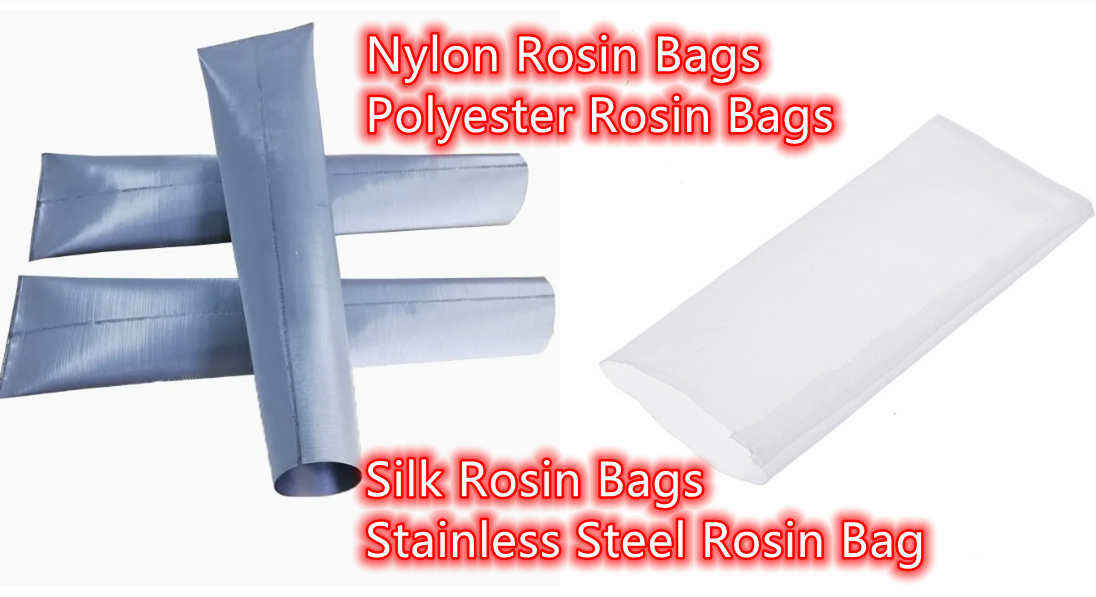The differences among nylon, polyester, silk, and stainless steel rosin bags primarily involve their material properties, which impact their performance, durability, and application in rosin pressing. Here's a breakdown of each type:

1. Nylon Rosin Bags
Material: Made from nylon mesh.
Strength: Durable and can withstand high pressure during pressing.
Heat Resistance: Good heat tolerance, typically up to 300–350°F (150–175°C).
Filtration: Available in a variety of micron sizes for precise filtering, making them suitable for retaining plant material while allowing rosin to flow through.
Flexibility: Stretchable, which helps during the pressing process.
Common Use: Widely used in rosin pressing for both personal and commercial purposes due to their balance of performance and cost.
These are the most popular due to their strength, durability, and elasticity. Nylon can stretch without breaking, making it less prone to blowouts. It also has a high boiling point, so it can withstand the heat used in rosin pressing
2. Polyester Rosin Bags
Material:Made from polyester mesh.
Strength: Strong and durable, but slightly less flexible than nylon.
Heat Resistance: Better heat resistance than nylon, tolerating temperatures up to around 400°F (200°C).
Filtration: Also available in multiple micron sizes for precise filtering.
Durability: Slightly more rigid, which can lead to better structural integrity under high pressure.
Common Use: Preferred for applications requiring higher heat resistance or when using hydraulic presses for rosin extraction.
These are a more affordable option compared to nylon. However, they are less elastic and more prone to blowouts. Polyester also tends to shrink when exposed to high temperatures.
3. Silk Rosin Bags
Material: Made from natural silk fibers.
Strength: Less durable compared to synthetic options like nylon or polyester.
Heat Resistance: Moderate heat resistance, but not as high as synthetic materials.
Filtration: Offers a smooth, gentle filtration that some enthusiasts prefer for delicate materials.
Flexibility: Very soft and flexible.
Common Use: Ideal for artisanal or small-batch extractions where preserving delicate material characteristics is important. Less commonly used in high-pressure or high-temperature situations due to their fragility.
These bags are non-toxic and natural. However, they are significantly more expensive than nylon and lack the elasticity needed to prevent blowouts. Some "silk" bags are actually made from nylon, so it's important to check the product specifications
4. Stainless Steel Rosin Bags
Material: Made from finely woven stainless steel mesh.
Strength: Extremely durable and resistant to tearing or bursting under pressure.
Heat Resistance: Exceptional heat tolerance, far exceeding synthetic or natural fibers.
Filtration: Provides consistent filtration but limited in variety of micron sizes compared to other materials.
Flexibility: Rigid, which may not conform well to material shape during pressing.
Common Use: Often used for industrial applications or when pressing at extremely high temperatures and pressures. Rarely used for small-scale or personal rosin extraction due to its rigidity.
These bags are very strong and can withstand high temperatures. They are food-grade and durable. However, they can produce a lower yield and may scratch the rosin press plates.
Key Factors to Consider:
Micron Size: Determines the filtration level and is available for most types except stainless steel, which has limited options.
Heat Tolerance: Higher temperatures may require polyester or stainless steel.
Durability: For frequent or heavy-duty use, polyester or stainless steel is better.
Cost: Nylon and polyester are more affordable and widely available; silk and stainless steel are generally more expensive.
Application: Personal use and artisanal extractions favor nylon, polyester, or silk, while stainless steel is suited for industrial or extreme conditions.
Each type of rosin bag has unique advantages, so the best choice depends on your specific pressing needs and preferences.
Contact: Jingda Filter Bags
Phone: +86 15100134172
E-mail: alice@jingdameshfilterbag.com
Add: No.20 Heping Road, Chang'an District, Shijiazhuang City, Hebei Province, China.